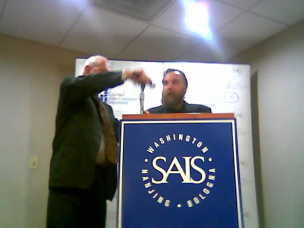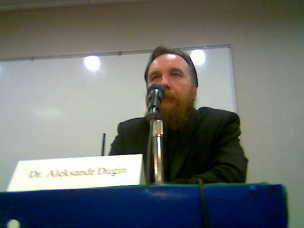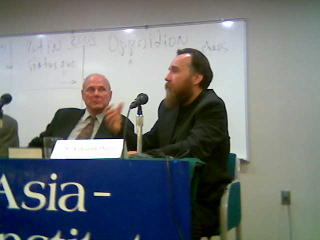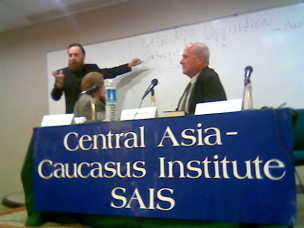 Dugin explained the historical roots of Eurasianism in the particularities of Russian identity. That is, Russians are not fully European, nor Asian. They are Eurasian people, rebutting Kipling's doggerel verse, because Russians live where East in fact meets West. Dugin covered the history of Russia from the adoption of Orthodoxy to the chaos of the Yeltsin years, and explained that Russia needed a new identity, and Eurasianism could provide it. However, Eurasianism was not in fact new, rather the traditional belief of the Russian masses, who had a special place. It was something that he, as an Old Believer, knew would promote religious tolerance. It was based on Sir Halford MacKinder's concept of "Land Power" rather than sea power. It was rooted in the sense that Russia must counter-balance the West, a desire for a multi-polar and particularist world, rather than a universal world. In this, it traced its pedigree to those who resisted universal Catholicism in favor of particularist Orthodoxy after the fall of Constantinople.
Dugin explained the historical roots of Eurasianism in the particularities of Russian identity. That is, Russians are not fully European, nor Asian. They are Eurasian people, rebutting Kipling's doggerel verse, because Russians live where East in fact meets West. Dugin covered the history of Russia from the adoption of Orthodoxy to the chaos of the Yeltsin years, and explained that Russia needed a new identity, and Eurasianism could provide it. However, Eurasianism was not in fact new, rather the traditional belief of the Russian masses, who had a special place. It was something that he, as an Old Believer, knew would promote religious tolerance. It was based on Sir Halford MacKinder's concept of "Land Power" rather than sea power. It was rooted in the sense that Russia must counter-balance the West, a desire for a multi-polar and particularist world, rather than a universal world. In this, it traced its pedigree to those who resisted universal Catholicism in favor of particularist Orthodoxy after the fall of Constantinople. In today's world, Eurasianism--a descendant of pan-Slavism and Greater Russianism--preserves a special mission for Russia. This sense of mission is necessary for a great nation, and Russia has always had one, whether Christian or Communist. Dugin believes that America also has a great mission, the spread of universal democratic and free market values, but that there are other missions possible. There is more to life than materialism and freedom, according to Dugin. There are spiritual and communal needs that the West cannot provide, so Eurasianism has a chance to offer what Americanism and globalism cannot. Many people don't want democracy imposed by force, they fear chaos, and don't want to lose their communal identities. A multi-polar world will permit more of that sort of freedom than a unipolar one, he believes.
In today's world, Eurasianism--a descendant of pan-Slavism and Greater Russianism--preserves a special mission for Russia. This sense of mission is necessary for a great nation, and Russia has always had one, whether Christian or Communist. Dugin believes that America also has a great mission, the spread of universal democratic and free market values, but that there are other missions possible. There is more to life than materialism and freedom, according to Dugin. There are spiritual and communal needs that the West cannot provide, so Eurasianism has a chance to offer what Americanism and globalism cannot. Many people don't want democracy imposed by force, they fear chaos, and don't want to lose their communal identities. A multi-polar world will permit more of that sort of freedom than a unipolar one, he believes. Dugin explained that under a Eurasianist scheme, each civilization would have its own sphere of influence. Russia would have the Eurasian continent, protected by its own version of the "Monroe Doctrine." China and Japan would enjoy condominium over the Pacific. The EU would have Western and Central Europe. The United States would provide an umbrella for North and South America. Thus, a Neoconservative project of unipolarity could be resisted by Eurasianist-led multipolarity. Dugin's analysis of Kremlin politics was insightful, pointing out that "Orange" liberal democracy is associated with chaos. He said that the future is unimaginable without Putin, that the person of Putin is the Status Quo in Russia. Eurasianism, he argued, provides an "ideocracy" that allows Russia to move beyond a cult of personality.
Dugin explained that under a Eurasianist scheme, each civilization would have its own sphere of influence. Russia would have the Eurasian continent, protected by its own version of the "Monroe Doctrine." China and Japan would enjoy condominium over the Pacific. The EU would have Western and Central Europe. The United States would provide an umbrella for North and South America. Thus, a Neoconservative project of unipolarity could be resisted by Eurasianist-led multipolarity. Dugin's analysis of Kremlin politics was insightful, pointing out that "Orange" liberal democracy is associated with chaos. He said that the future is unimaginable without Putin, that the person of Putin is the Status Quo in Russia. Eurasianism, he argued, provides an "ideocracy" that allows Russia to move beyond a cult of personality. Dugin's ideas appear to be based on a traditional geopolitical world-view, rooted in the control of land. His economic backgound seemed a bit vague. At one point, Dugan claimed oil revenues were not real wealth, because the money just came out of a hole in the ground. I'm sure the Rockefeller family, as well as the Saudi kings, would be surprised to learn that their money wasn't worth anything. Perhaps it is because Dugin, a former leader of the National Bolsheviks, still holds on to Marx's Labor Theory of Value (he talked about the need for nationalization, as well). Eurasianism has explanatory power, it is how many Russians view the world. But it doesn't explain how the world really works. Only how Russians would like it to work.
Dugin's ideas appear to be based on a traditional geopolitical world-view, rooted in the control of land. His economic backgound seemed a bit vague. At one point, Dugan claimed oil revenues were not real wealth, because the money just came out of a hole in the ground. I'm sure the Rockefeller family, as well as the Saudi kings, would be surprised to learn that their money wasn't worth anything. Perhaps it is because Dugin, a former leader of the National Bolsheviks, still holds on to Marx's Labor Theory of Value (he talked about the need for nationalization, as well). Eurasianism has explanatory power, it is how many Russians view the world. But it doesn't explain how the world really works. Only how Russians would like it to work.As Texans say, I wouldn't bet the ranch on Eurasianism. Russia needs to come up with something a little more sophisticated and realistic. For, as my Georgian seatmate turned and said to me at the end of Dugin's explanation of Eurasianism: "It means Russian domination."